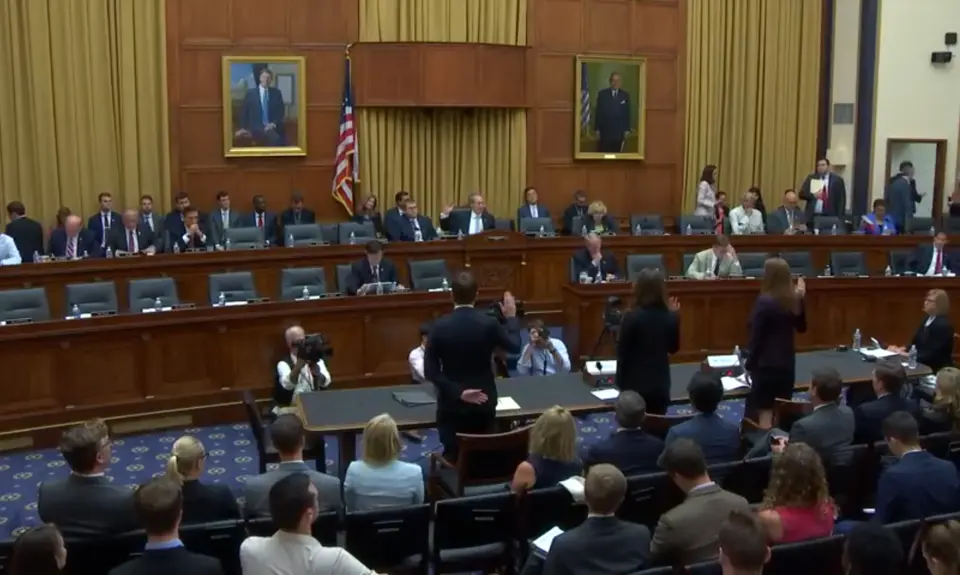Members of the House Judiciary Committee gathered this morning to entertain, once again, the repeatedly debunked accusations that social media websites like Facebook systemically censor conservative viewpoints on ideological grounds.
This morning, Rep. Bob Goodlatte and his colleagues hosted representatives from Facebook, YouTube and Twitter for a public hearing during which it was advertised that company representatives would “answer questions on their content moderation practices and how they can be better stewards of free speech in the United States and abroad.” Although the hearing did include a hodgepodge of inquiries about censorship, algorithm design and suspected Russian meddling in the 2016 election, many GOP members of the committee used their time to hammer tech companies with mythical nonsense straight out of Infowars (speaking of which, Infowars host Alex Jones has claimed numerous times on air during the last week that the White House and members of Congress have asked him to produce a report on the bias conservatives say they face online.)
In a tweet advertising the public hearing, the House Judiciary Committee posed the question, “So, why am I getting shadowbanned?”:
Watch this morning's hearing live here @10am: https://t.co/lge02cRH7Z pic.twitter.com/XZ27J3VEuX
— House Judiciary ⚖ (@HouseJudiciary) July 17, 2018
The House Judiciary Committee hosted a similarly themed meeting in April with pro-Trump video bloggers Lynnette Hardaway and Rochelle Richardson, who are best known by their on-screen personas “Diamond & Silk.” In retrospect, tech companies were wise to decline invitations to attend the April session because it ended up being an unmitigated train wreck.
But for whatever reason, Facebook, YouTube and Twitter decided that this morning they would indulge GOP congressmen, who entered the discussion with claims that conservatives are being filtered off of social media—which is a claim that Republicans and conservatives routinely make in order to justify their never-ending persecution complex and fetish for punishing those who do not bend to their will.
In April, ThinkProgress thoroughly debunked Diamond & Silk’s claims that Facebook was censoring their content. Yesterday, Media Matters released a study of 463 Facebook pages that found partisan pages have almost equal engagement numbers and further put claims of ideological censorship to rest.
Twitter senior strategist for public policy Nick Pickles wrote in prepared remarks to the Judiciary Committee that accusations that Twitter uses policies designed to de-rank “those who are simply looking to disrupt the conversation” on its platform was a plot to censor conservative voices are “unfounded and false”:
Ultimately, everyone’s comments and perspectives are available, but those who are simply looking to disrupt the conversation will not be rewarded by having their Tweets placed at the top of the conversation or search results. Early results demonstrated that this approach has a positive impact, resulting in a four percent decrease in abuse reports from search and eight percent fewer abuse reports from conversations.
Some critics have described the sum of all of this work as a banning of conservative voices. Let me make clear to the Committee today that these claims are unfounded and false. In fact, we have deliberately taken this approach as a robust defense against bias, as it requires us to define and act upon bad conduct, not a specific type of speech. Our purpose is to serve the conversation, not to make value judgments on personal beliefs.
Some tech companies have, however, attempted to curb the spread of deliberately false information and malicious conspiracy theories on their platforms, which may be limiting the conservative movement's reach given that a significant share of modern conservative media's messaging relies on outlets that misrepresent and distort the truth.
Goodlatte questioned whether the market share that the three companies hold on the social media industry would make those companies less inclined to listen to concerns about their platforms and suggested that users who believe they are censored don’t believe that they can simply use a competing internet service.
Rep. Steve King (R-IA), who regularly sympathizes with the fringes of right-wing politics, demanded that Facebook’s representative explain why Gateway Pundit and Diamond & Silk saw their web traffic decline on social media sites.
Rep. Steve King wondering why the Gateway Pundit isn’t getting more traffic from Facebook. pic.twitter.com/J2cJb2gIAF
— Lydia Polgreen (@lpolgreen) July 17, 2018
Rep. Louie Gohmert (R-TX) went on the offensive during the hearing and accused the tech company representatives of appearing on Capitol Hill this morning in order to assist Democrats in vilifying Russia. He asked site representatives to name any other countries that used their platforms to interfere with elections, and when representatives told Gohmert that they would follow up with more information, he jeered at them.
“You came prepared to help the Democrats establish about Russia, but you can't point out any other country? Is that right?” Gohmert said to Facebook’s representative.
“Are you only here to condemn the Russians?” Gohmert asked YouTube’s representative.
“You did not come prepared to answer any question about any other country but Russia, is that correct?” Gohmert asked of Twitter’s representative.
Rep. Lamar Smith (R-TX) accused social media companies of having “repeatedly censored, removed or shadowbanned conservative journalists, news organizations and media outlets that do not share their liberal political views.” Smith also accused Google of blocking "references to Jesus, Chick-fil-A, and the Catholic religion” and asked, “When will it stop?" Smith then lamented the fact that some social media organizations have received help identifying hateful activity on their platforms from the Southern Poverty Law Center.
Rep. Ted Poe (R-TX) claimed that Facebook and YouTube’s policy of using third-party entities to combat misinformation was “opening up a Pandora’s box” because “what one person may think is fake news, somebody else believes is the gospel truth.” While questioning the authority of these third-party groups, Poe mistakenly referred to the fact-checking site Snopes as “Snoops.”






